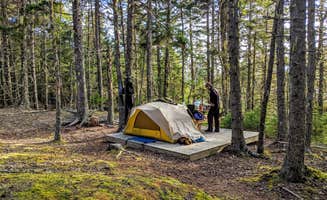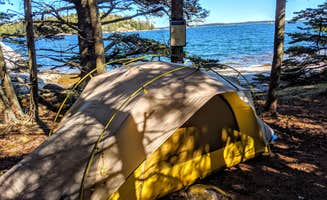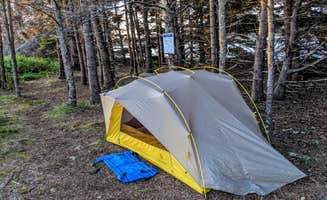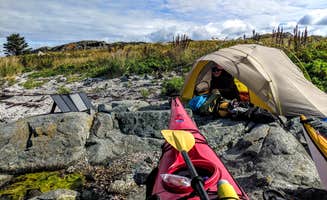Dispersed camping near Bass Harbor, Maine centers on island-based experiences accessible only by boat. The area features several small islands within the Deer Isle Archipelago with primitive camping sites ranging from exposed shoreline positions to protected wooded areas. Campers must navigate varying tidal conditions that can significantly impact landing options and site access throughout the day.
What to do
Water exploration: Paddle to Marshall Island for secluded camping options. The island serves as an excellent base for stargazing, with one reviewer noting it offers "some of the best stargazing spots we've ever seen." The island features two designated camping areas with one located near Sand Cove on the southeast side.
Island hopping: Use Wheat Island as a strategic base for exploring Isle au Haut, a remote section of Acadia National Park. A camper noted it provides "a perfect island for exploring the close-by Isle au Haut" when Duck Harbor Campground reservations aren't available. The larger southwest site accommodates groups and provides sunset views.
Beach combing: Collect shells along the shorelines of several islands. Doliver Island features a "gorgeous shell covered beach" according to visitors, with views toward Isle au Haut from its shoreline. Morning low tides typically expose the most extensive beach areas for exploration.
What campers like
Campsite privacy: The northeast site on Buckle Island provides a secluded option that's "perfect for those new to sea kayak camping" with its accessible sandy shore. The landing area remains exposed "for a good portion of the day" making it particularly suitable for beginners navigating tidal landings for the first time.
Sunset viewing: Multiple islands offer west-facing campsites ideal for evening light. One camper at Wheat Island described experiencing "a gorgeous view of the sun setting and full moon rising" from the southwest campsite, which accommodates larger groups comfortably.
Conservation opportunities: Participate in stewardship activities while camping. Marshall Island campers can conduct beach clean-ups during their stay and "receive a Maine Coast Heritage Trust hat" by sending in a picture of their efforts, combining recreation with environmental protection.
What you should know
Landing challenges: Plan arrival times carefully around tides. Wheat Island "can be a tricky island to land on at high tide," requiring strategic planning for safe access. Similar conditions exist at other islands in the archipelago.
Insect preparation: Bring effective mosquito protection even in early fall. A visitor to Doliver Island reported mosquitoes "were pretty bad all day long" despite camping in early September when they expected fewer insects.
Supply limitations: No fresh water sources exist on any islands. Campers must carry all drinking water or make arrangements for resupply. One reviewer mentioned Swan's Island as an option that "has a very small grocery store and town office with fresh water" accessible by short paddle from Marshall Island.
Tips for camping with families
Site selection: Choose islands with established facilities for first-time family trips. Marshall Island offers practical amenities with "a tent platform and a picnic table at each site" near Sand Cove, making setup easier with children.
Space considerations: Verify site capacity before arrival with children and gear. Doliver Island has "barely a tent space" according to one camper, describing it as "small with barely a tent space" but potentially useful as a stopping point during multi-day trips.
Emergency planning: Identify nearby services when camping with children. Swan's Island provides critical access to supplies and is noted as "a short paddle away" from Marshall Island, offering emergency resupply options if needed.
Tips from RVers
No RV access: These islands are exclusively boat-in camping destinations with no vehicle access. All camping gear must be transported via watercraft and carried to campsites.
Gear minimization: Pack essential equipment only for island camping. The limited space and boat transportation necessitates careful planning, with priority given to safety equipment, water, and proper waste disposal supplies.
Alternative options: Consider mainland campgrounds when weather conditions make island camping unsafe. Several developed campgrounds operate within driving distance of Bass Harbor and provide alternatives when wind or wave conditions prevent safe passage to the islands.





